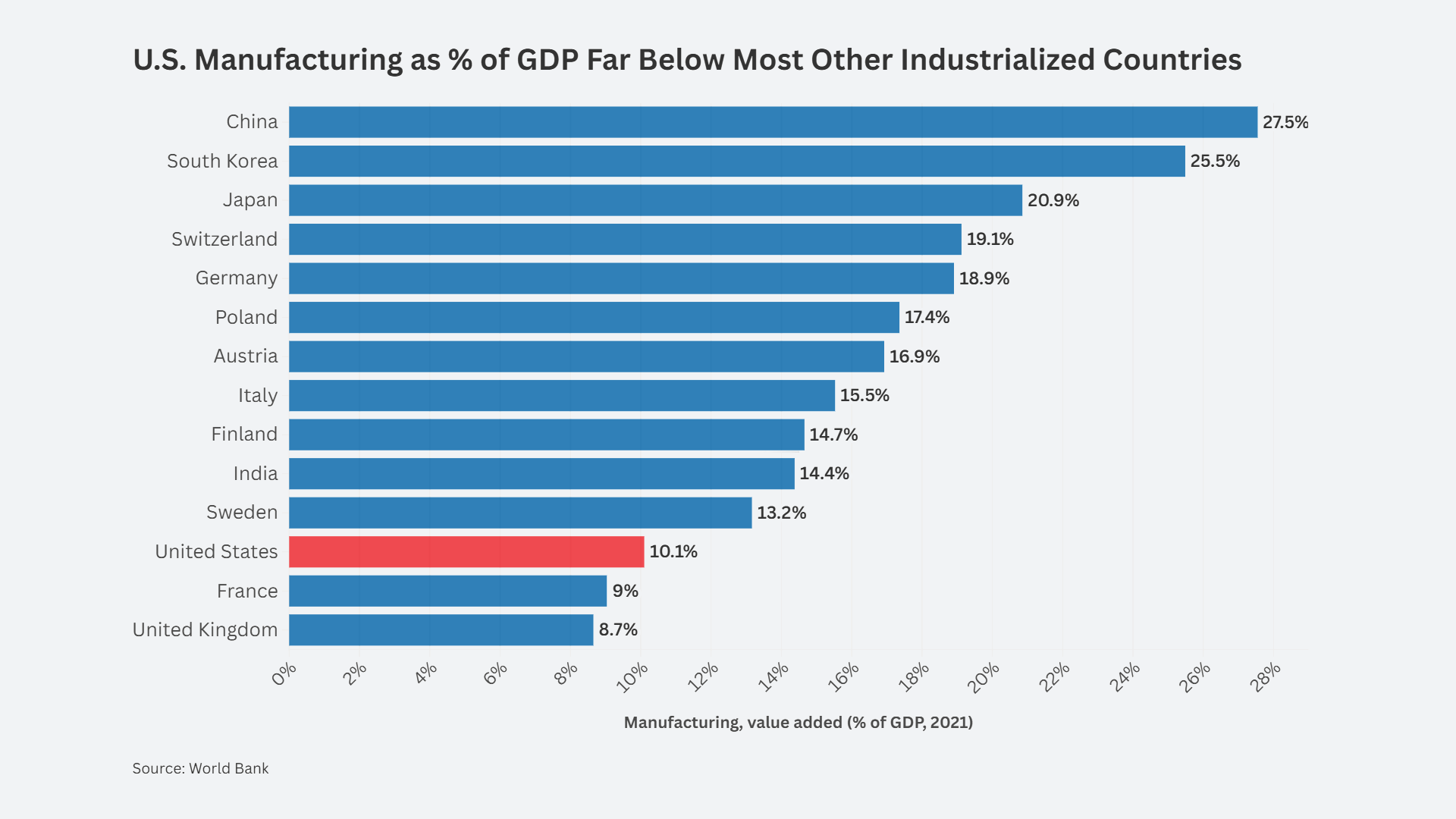For years it has been known that minority workers – namely Black and Latino blue-collar labor without college degrees – have been decimated by free trade deals. Last year, the International Trade Commission even put pen to paper on the topic. According to the ITC, there’s been “negligible benefits for the U.S. economy” from 16 trade agreements they analyzed that were signed between 1985 and 2020. Their report, published in June, refuted decades of claims that sweeping free trade deals were a boon to all.
In U.S. localities that had industries which had been protected by tariffs on Mexican goods, findings show that there was lower wage growth for blue-collar workers in those U.S. industries and localities, lower wage growth for blue-collar women than men, a larger increase in unemployment among nonwhite workers than white workers, and outward migration of workers without a high-school degree from those localities. — Economic Impact of Trade Agreements Implemented under Trade Authorities Procedures, 2021 Report, Publication Number 5199, June 2021
In fact, one company, Google, has added more to U.S. GDP over the period than all 16 trade agreements combined. The ITCs 16 trade agreements led to huge, overlooked costs. Those costs were the creation of job deserts that led to social devastation from upstate New York to Oakland, California, and hundreds of points in between, as manufacturing jobs went overseas, and those higher-paying jobs were replaced by imports.
Unlike Google, though, not everyone laid off from a steel mill in Gary, Indiana or – more recently – a solar panel manufacturing plant in Huntsville, Alabama wants to learn to code.
Michael Mitchell from the Alliance of American Manufacturing used to be a union man in the steel industry in Gary, Indiana, a city heavily populated with Black families.
“Bad trade deals and automation impacted union labor for US steel, and that crushed the population of Gary, cutting it almost in half,” he said Monday during an ITC roundtable discussion titled “Distributional Effects of Trade and Trade Policy on U.S. Workers.”
“I got laid off in 1979 and did not work a full year until 1989,” he said. “I had to work two jobs, the community lost its tax base; businesses started to leave Gary and the community had no money for services that the people needed like hospitals and schools. It’s all a vicious cycle created because of these bad trade deals.”
At the time, trade deals were in their infancy. NAFTA wouldn’t be signed for years later. China was still making Happy Meal toys and Christmas ornaments for Americans. In the 1990s, with the opening up of China, Gary and other cities like it got worse.
“Furniture, plastics, rubber, chemicals, paper and pulp, the beverage industry…in the last 25 years, Black people lost 495,000 manufacturing jobs. The promises from NAFTA and the WTO about more trade meaning more jobs definitely did not materialize for Black people,” said Derick Holt, a trade lawyer with Wiley Rein in Washington, DC.
William Spriggs from the AFL-CIO and Howard University told the roundtable that he did a study looking entirely at trade impacts on labor, and not automation impacts. He told the ITC, led by Commissioner and moderator Rhonda Schmidtlein, that vast amounts of imports from China did a number on blue-collar labor in mid-sized and smaller communities nationwide.
“Within a commute zone (to the outsourced job) there was an immediate loss of jobs to those workers who were exposed to imports from China,” he said, adding that while all workers suffered regardless of race, the big problem for Black workers was that this decline in higher-paying jobs led to intense competition for lower-paying jobs. In majority Black communities it became harder to find the few good jobs remaining, pushing people into retail services or government employment.
“What also happened for Black workers is the loss of union jobs where you would have a pension or health insurance, so losing companies like U.S. Steel meant losing all of those benefits. It was a cascading effect that…sets in motion a competition for the few ‘next best thing’ employment,” Spriggs said. “Black people lost most due to trade agreements. Trade models assume workers just magically move from place to place. That’s not the real world. We don’t distribute the good jobs. So those that are left behind are stuck with fewer good job opportunities.”
CPA looked at this issue closely in a working paper published in May. That job quality is worse for Black, and Latinos has been known for years. That it is worse than most people would have imagined is less known.
In an era where the government is focused on diversity and inclusion, globalist trade deals that ignore blue-collar labor, especially among lesser-educated Black and Latino workers, are a disaster in the making.
CPA’s Job Quality Index, discussed in the ITC roundtable, found that:
- Black American job quality is far worse than that of the total population. The Black Job Quality Index (JQI) for 2020 was 38.7 out of 100, more than 40 points below the JQI for the total U.S. private-sector production and non-supervisor (non-managerial) workforce. For the Black non-supervisory workforce, 72% of their jobs are low quality, and only 28% rank as high-quality. More than any other group, Black Americans are paying the price for the decline in U.S. job quality in recent decades.
- The JQI for Hispanic Americans was 38.1 out of 100 in 2020, 42 points below the average U.S. JQI. In 2002, 28% of Hispanic American employees held high-quality jobs and 72% were in low-quality employment. Although far below the U.S. JQI, the Hispanic American JQI rose by 29% since 2007, when it was just 29.5 out of 100. The increase in the Hispanic American JQI was driven by the growth of jobs in high-quality health care and construction jobs.
“The trade agreements we have made over the past few decades have not been made with the impacts of workers in mind, let alone the types of workers,” CPA economist Amanda Mayoral told the roundtable about our deindustrialization trend. “We have to normalize this type of thinking going forward to improve the situation.”
“The job composition for minority workers has changed a lot since the 1990s. We have lost more manufacturing jobs and gained more service jobs. Our companies are competing with countries that are subsidizing and manipulating currency. This is the overall trend. The decline in manufacturing jobs has greatly damaged the chances of non-college degree holding Americans. You are depriving people of opportunity.” – Amanda Mayoral, CPA
Keith Odume from U.S. Steelworkers Union Local 1277 in Syracuse said that he, too, has felt the impact of bad trade deals. He told the roundtable that it has decimated Syracuse city.
“Syracuse used to be a manufacturing hub. A lot of my family members came up from the south for better jobs and they came specifically to Syracuse because you had Carrier, you had Ford. There were plenty of jobs. You could quit one job and go to another job and make a living. Communities were built around them. If you had one of those jobs, you had a sense of pride,” he said.
“But this was from the early 80s up to the mid-90s. I know communities in Syracuse that were flourishing with their own grocery stores…it was growing everywhere, but not anymore,” he said about upstate New York’s post-90s job desertification.
“All those jobs (in upstate New York) are gone, and I can bet it is because of trade deals that made it less interesting for companies to stay there. I have seen it where I’m from: higher crime rates, no solutions on offer. Now the push is ‘go green,’ and ‘new technology,’ but who do those jobs benefit? Instead you get retail jobs where you can’t make a decent living. I’ve seen the decimation. I’ve seen what these global trade deals do in my area of New York.” – Keith Odume, USW Union Local 1277
Schmidtlein asked roundtable members for some ideas on solutions, which suggests all of this is new news to the ITC and USTR.
Odume said you have to get working people involved as stakeholders, not just the global corporations focused on margins. “You’ve got people making decisions who don’t know anything about what is going on here,” he said about upstate New York.
The roundtable will result in a report sent to the USTR. It’s a political exercise to show the USTR is connecting to the American public. But to get it right requires work, not just roundtables. The ITC already knows who the stakeholders are at the top and at the bottom. And they already know, based on their June report, what it looks like on the ground for those on the bottom who can become collateral damage to offshoring.
“Our import strategy told the world that we are a high wage economy so why don’t you try and sell cheap imports here and our people will move to low productivity industries…and what that has done for Blacks and Latinos is horrific,” CPAs chief economist Jeff Ferry told the ITC roundtable. “Manufacturing offers a path to prosperity for people who only have a high school degree. When we allow industries to falter, minorities lose out because they are overrepresented in the population without college degrees. Some industries provide more opportunities than others, like steel…thanks to tariffs our steel industry has survived and grown and hired thousands of new employees at good wage levels. These are important economic fundamentals to understand about trade,” said Ferry. “The ITC has to come up with new approaches.”
Quantifying Job Quality for U.S., Black, Hispanic, and Asian American Workers













